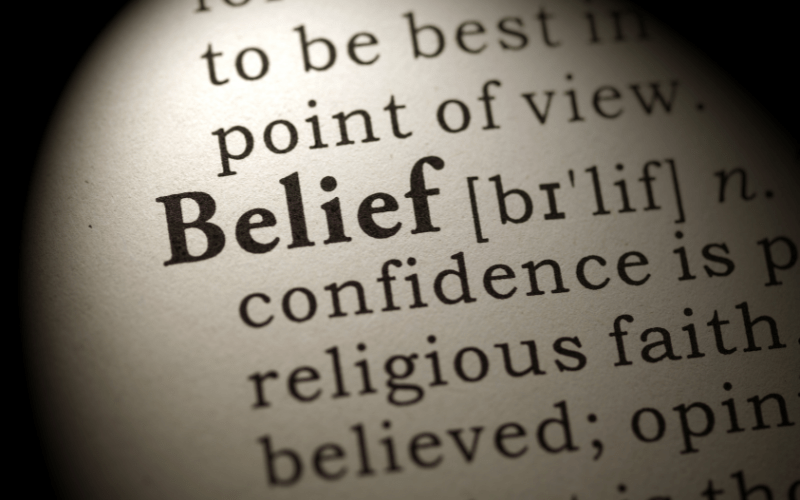Treating Religious and Spiritual Trauma with EMDR Therapy
January is Spiritual Abuse Awareness Month in some circles, so we turned to EMDRIA member Cassidy DuHadway, LCSW, to help us understand more about treating religious and spiritual trauma with EMDR therapy.
Guest Blog Post by Cassidy DuHadway, LCSW
 Tell us a little bit about you, your experience becoming an EMDR therapist, and what drew you to the topic of religious and spiritual trauma.
Tell us a little bit about you, your experience becoming an EMDR therapist, and what drew you to the topic of religious and spiritual trauma.
Embarking on this therapist journey for over 15 years has been quite the adventure, as a therapist and person. In 2015, I was trained in EMDR, and it was a game-changer. I realized there was so much more I could do to help people heal from their trauma. It was like unlocking a new level of potential as a therapist.
What drew me to work with religious trauma was my journey growing up in a religion that didn’t allow me to be authentic. It wasn’t ok to be me. I’ve had to overcome my spiritual trauma on my healing journey. I know firsthand what it’s like to break free from a system that stifles authenticity.
In your experience, what might bring a client who has experienced religious or spiritual trauma into therapy?
Right now, many people are working on it specifically, but often, it’s just people coming to work on their mental health. They are looking for help with their anxiety or their sense of self. Sometimes, it’s being stuck in a relationship where the women have unequal responsibilities. Or it might be someone coming in to help with their sense of identity, belonging, and/or worth.
Tell us how a therapist might use EMDR therapy to treat religious and spiritual trauma. What successes have you seen?
EMDR therapy is an excellent tool for religious and spiritual trauma. Many beliefs about ourselves and who we are are engrained into us from a very young age, both at church and home with our families. Those beliefs become so familiar to us that we don’t even realize we have them. With EMDR, we can help people shift their underlying beliefs to something adaptive, allowing them to live with an inherent sense of worth, love, and belonging, to be authentic, and to live the life they want.
The most incredible successes I have experienced are small but always so impactful. I have had clients come to me struggling with anxiety and mental health. Still, when we dig into it, they live in a constant state of shame, with an internal dialogue judging themselves for not being perfect or righteous enough. They have given themselves to service and prioritize everyone else around them. With EMDR, they can shift from “I’m not important” and “I am only worthy (enough) if I act, look and be _____” to “I AM important, it’s ok to take care of myself and who I am is worthy, just the way I am.”
I don’t know how to describe it, but watching someone make that shift is an honor. When we believe in our inherent worth and value, we are empowered to be in a relationship with people who treat us that way and live the life we want.
Are there any cautionary measures you would like to mention regarding using EMDR therapy with clients who have religious and/or spiritual trauma?
Absolutely. When working with individuals who have experienced Religious Trauma or Spiritual Abuse, it’s like peeling back layers to reveal a system that tells them how to be and what to believe. In the therapeutic setting, it’s crucial not to assume the role of authority or power. Instead, it’s all about nudging them towards self-trust, helping them realize they’ve got the power to make their own decisions. I often use EMDR to help shift those beliefs around trust, decision-making, and mistakes.
Additionally, it’s vital to address your own religious or spiritual biases. Whether you identify with a specific religion or not or are somewhere in between, it’s essential to navigate these biases consciously. Here’s the question you have to ask yourself: If you truly believe in a religion, can you effectively help someone questioning or doubting their religion, trying to heal from the associated trauma? And on the flip side, if you don’t believe in what they believe, can you genuinely support someone navigating their healing journey within the context of their religion?
It can be tricky, but approaching it with genuine openness and sensitivity is the real deal for providing authentic support and creating an environment where true healing can happen.
Are there any myths you’d like to bust about EMDR therapy and religious and spiritual trauma?
Yes. Religious trauma can happen inside any religion or spiritual group. It can even happen within groups with the same hallmarks of religious/spiritual groups like politics, sports, etc.
Oh, and… EMDR doesn’t change your religion or spirituality; it can’t. It only helps the person heal so they can make their own choices based on their belief systems.
What multicultural considerations might EMDR therapists need to keep in mind regarding EMDR therapy and religious and spiritual trauma?
Various religions, in their unique ways, teach and enforce racism, sexism, and bigotry. Grasping the impact of these teachings on the individuals we work with is essential. These teachings and doctrines shape social dynamics and influence subconscious beliefs about one’s identity. Unpacking and processing these ingrained notions becomes a significant part of the therapeutic EMDR work.
Additionally, as therapists, continual education is vital. Deepening our understanding of the intersections of religion, identity, and societal structures equips us to navigate the complexities of religious and spiritual trauma. This ongoing learning enhances our ability to create an informed and supportive therapeutic environment.
What is your favorite free resource that you would suggest to other EMDR therapists interested in learning more about using EMDR and religious and spiritual trauma?
Resources from me:
- Access any of my handouts about religious trauma from my EMDR and Religious Trauma/Spiritual Abuse workshop at the 2023 EMDRIA Conference, including a book list and other resources here: https://www.cassidyduhadway.com/religious-trauma.
- EMDRIA podcast interview EMDR Therapy for Religious and Spiritual Trauma: https://www.emdria.org/podcast/emdr-therapy-for-religious-and-spiritual-trauma/
In addition, here are some researched and valid screeners:
- Spiritual Abuse Screener – Dan Koch – https://www.dankochwords.com/spiritual-abuse-screener.html
- Spiritual Abuse Questionnaire – https://twu-ir.tdl.org/bitstream/handle/11274/8760/2016KellerOCR.pdf?isAllowed=y&sequence=8
Easy access online quiz:
- Adverse Religious Experiences Questionnaire by Rebekah Drumsta – https://rebekahdrumsta.com/blog/adverse-religious-experiences-questionnaire
Other resources:
- Religious Trauma Institute: https://www.religioustraumainstitute.com/
- Empathy Paradigm has free PDFs on Religious Trauma Symptoms and Religious Trauma Beliefs: https://empathyparadigm.com/religious-trauma
Cassidy DuHadway, LCSW, is a respected therapist and trainer recognized for her profound insights into the human experience and her exceptional skill in guiding healing journeys. She specializes in trauma, including early-childhood wounds, attachment and Religious/Spiritual Trauma, making her a sought-after expert in the field.
As CEO of Purple Sky Counseling and in her role as an EMDR Approved Trainer and Consultant, Cassidy not only trains and inspires fellow therapists but also empowers clients on their healing journeys. Her distinctive approach revolves around normalizing the human experience, cultivating empathy, and fostering acceptance to instigate enduring change.
Cassidy DuHadway, LCSW, remains a source of inspiration for EMDR therapists and clients alike, making an indelible impact on the mental health landscape through her unwavering dedication and compassionate commitment to healing.
References
EMDRIA. EMDR therapy for religious and spiritual trauma with Cassidy DuHadway. Let’s Talk EMDR. https://www.emdria.org/podcast/emdr-therapy-for-religious-and-spiritual-trauma/
Keller, K. H. (2016). Development of a spiritual abuse questionnaire [Doctoral dissertation, Texas Woman’s University.] http://hdl.handle.net/11274/8760
Back to Focal Point Blog Homepage
Additional Resources
If you are a therapist interested in the EMDR training:
- Learn more about EMDR at the EMDRIA Library
- Learn more about EMDR Training
- Search for an EMDR Training Provider
- Check out our EMDR Training FAQ
If you are EMDR trained:
- Check out EMDRIA’s Let’s Talk EMDR Podcast
- Check out the EMDRIA blog, Focal Point
- Learn more about EMDRIA membership
- Search for Continuing Education opportunities
If you are an EMDRIA Member:
Date
January 26, 2024
Contributor(s)
Cassidy DuHadway
Topics
Religious Trauma





